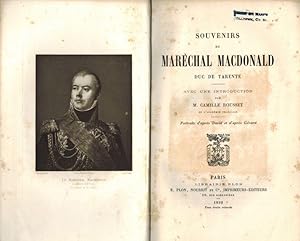About this Item
14 cm x 21.5 cm. 415 Pages. Couverture originale rigide avec reliure en tissu. Bon état avec seulement des signes mineurs d'usure externe. Traces de jaunissement sur les pages. Reliure extérieure abîmée. Étienne Jacques-Joseph-Alexandre Macdonald, 1st Duke of Taranto (17 November 1765 25 September 1840), was a Marshal of the Empire and military leader during the French Revolutionary and Napoleonic Wars. Étienne Jacques Joseph Alexandre Macdonald was born in Sedan, Ardennes, France. His father, Neil MacEachen, later MacDonald, came from a Jacobite family from Howbeg in South Uist, in the West of Scotland. He was a close relative of Flora MacDonald, who played a key role in the escape of Prince Charles Edward Stuart after the failure of the 1745 Rising. In 1784, Macdonald joined the Irish Legion, raised to support the revolutionary party in the Dutch Republic against the Kingdom of Prussia and was made lieutenant on 1 April 1785. After it was disbanded, he received a commission in Dillon's Regiment. At the start of the French Revolution, the regiment of Dillon remained loyal to the King, except for Macdonald, who was in love with Mlle Jacob, whose father was an enthusiastic revolutionary. After his marriage on May 5, 1791, on 17 August 1792, he was promoted to captain, and on 29 August 1792 he was appointed aide-de-camp to General Charles François Dumouriez. He distinguished himself at the Battle of Jemappes, and was promoted to lieutenant colonel on 12 November 1792 and then colonel on 8 March 1793. He refused to desert to the Austrians with Dumouriez and as a reward was made général de brigade on 26 August 1793 and appointed to command the leading brigade in Pichegru's invasion of the Netherlands. His knowledge of the country proved useful, and he was instrumental in the capture of the Dutch fleet by French hussars in January 1795. In 1797, having been made général de division back in November 1794, he now served first in the Army of the Rhine and later in the Army of Italy as of 24 April 1798. When he reached Italy in 1798, the Treaty of Campo Formio had been signed on 18 October 1797, and Bonaparte had returned to France; but, under the direction of Berthier, Macdonald occupied Rome in the 1798-1799 Roman Republic, of which he was made governor on 19 November 1798, and then in conjunction with Championnet he defeated General Mack at the Battle of Ferentino, the Battle of Otricoli, the 5 December 1798 Battle of Civita Castellana, and two military affairs, first at Calvi Risorta and then on 3 January 1799 at Capua, and then by 10 January 1799, he had resigned his Office due to disagreements with Championnet. However, despite any differences, the men managed to conquer the 1282-1799 Kingdom of Naples, which then became known as the Parthenopaean Republic. Russian General Suvorov invaded northern Italy in March 1799 with an Austro-Russian army, and was undoing the conquests of Bonaparte and defeated Moreau at Cassano and San Giuliano. In response Macdonald moved northwards in command of the Armée de Naples. With 36,000 men, he attacked Suvorov's 22,000 men at the Trebbia. After three days' fighting, receiving no help from Moreau, he was utterly defeated and retreated to Genoa. Later, he was made governor of Versailles and acquiesced, even if he did not participate, in the events of the 18 Brumaire. In 1800, he received command of the army in the Helvetic Republic, maintaining communications between the armies of Germany and of Italy. He carried out his orders diligently, and in the winter of 1800 01, he was ordered to march over the Splügen Pass at the head of the Army of the Grisons. This achievement is described by Mathieu Dumas, his chief of staff. It is sometimes considered as noteworthy as Bonaparte's passage of the St Bernard before the Battle of Marengo, although Macdonald did not fight a battle. On his return to Paris, Macdonald married the widow of General Joubert, and was appointed French ambassador to Denmark. Retur.
Seller Inventory # 72948AB
Contact seller
Report this item
